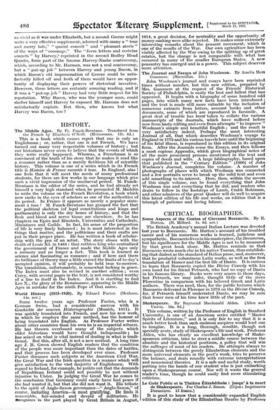World History (1815-1920). By Eduard Fueter. (Methuen. 148. net.) Some
twelve years ago Professor Fueter, who is a German Swiss, had a considerable success with his Ge,schichte der neueren Historiographie (Munich, 1911). It was quickly translated into French, and now his new work, in which he employs the same method, has the honour of being translated into English. As Professor Fueter writes about other countries than his own he is an impartial witness. He has thrown overboard many of the subjects which older historians would have thought indispensable ; he has seized on what is vital instead of dealing in what is tradi- tional. But this, after all, it not a new method. A long time ago J. R. Green showed English readers that the condition of the people was more important than the dates of battles, and that process has been developed ever since. Professor Fueter discusses such subjects as the American Civil War, the Great War and the Irish question in a manner which will give satisfaction to the vast majority of Englishmen. With regard to Ireland, for example, he points out that the demands of Republican Ireland could not possibly be met without injustice to Ulster. In judging the Great War he comes to the conclusion that Germany could easily have had peace if !she had wanted it, but that she did not want it. tribute to the spirit of Aneo-Saxon governance-1' Anglo-Saxon," of course, including America—is most gratifying. He finds it reasonable, fair-minded and devoid of militarism. He
cognizes in the part played by Great Britain in August, 1914, a great decision, for neutrality and the opportunity of money-making were alike rejected. He makes some extremely interesting remarks about the peasant movement, which no one of the results of the War. Our own agriculture has been visibly affected by the War owing to the splitting up of great estates, but the change is not comparable with what has occurred in many of the smaller European States. A new peasantry has emerged and is a power. This subject deserves more attention.


































































 Previous page
Previous page